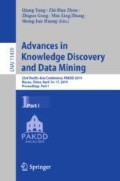Abstract
Keyword extraction is a critical technique in natural language processing. For this essential task we present a simple yet efficient architecture involving character-level convolutional neural tensor networks. The proposed architecture learns the relations between a document and each word within the document and treats keyword extraction as a supervised binary classification problem. In contrast to traditional supervised approaches, our model learns the distributional vector representations for both documents and words, which directly embeds semantic information and background knowledge without the need for handcrafted features. Most importantly, we model semantics down to the character level to capture morphological information about words, which although ignored in related literature effectively mitigates the unknown word problem in supervised learning approaches for keyword extraction. In the experiments, we compare the proposed model with several state-of-the-art supervised and unsupervised approaches for keyword extraction. Experiments conducted on two datasets attest the effectiveness of the proposed deep learning framework in significantly outperforming several baseline methods.
Access this chapter
Tax calculation will be finalised at checkout
Purchases are for personal use only
Notes
- 1.
Note that for simplicity, we omit the j subscript of each word matrix \(X_j\).
- 2.
- 3.
These are the best models among different window sizes; we used the code at https://github.com/Tixierae/EMNLP_2016 to reproduce the experiments.
- 4.
- 5.
Over 96%–97% words are with less or equal than 15 characters.
References
Bougouin, A., Boudin, F., Daille, B.: TopicRank: graph-based topic ranking for keyphrase extraction. In: Proceedings of the 6th International Joint Conference on Natural Language Processing, pp. 543–551 (2013)
Brin, S., Page, L.: The anatomy of a large-scale hypertextual web search engine. In: Proceedings of the 7th International Conference on World Wide Web, pp. 107–117 (1998)
Duchi, J., Hazan, E., Singer, Y.: Adaptive subgradient methods for online learning and stochastic optimization. J. Mach. Learn. Res. 12(Jul), 2121–2159 (2011)
Gutwin, C., Paynter, G., Witten, I., Nevill-Manning, C., Frank, E.: Improving browsing in digital libraries with keyphrase indexes. Decis. Support Syst. 27(1–2), 81–104 (1999)
Hasan, K.S., Ng, V.: Automatic keyphrase extraction: a survey of the state of the art. In: Proceedings of the 52nd Annual Meeting of the Association for Computational Linguistics (vol. 1: Long Papers), pp. 1262–1273 (2014)
Hulth, A.: Improved automatic keyword extraction given more linguistic knowledge. In: Proceedings of the 2003 Conference on Empirical Methods in Natural Language Processing, pp. 216–223 (2003)
Hulth, A., Megyesi, B.B.: A study on automatically extracted keywords in text categorization. In: Proceedings of the 21st International Conference on Computational Linguistics and the 44th Annual Meeting of the Association for Computational Linguistics, pp. 537–544 (2006)
Kalchbrenner, N., Grefenstette, E., Blunsom, P.: A convolutional neural network for modelling sentences. In: Proceedings of the 52nd Annual Meeting of the Association for Computational Linguistics (vol. 1: Long Papers), pp. 655–665 (2014)
Kim, S.N., Medelyan, O., Kan, M.Y., Baldwin, T.: Semeval-2010 task 5: automatic keyphrase extraction from scientific articles. In: Proceedings of the 5th International Workshop on Semantic Evaluation, pp. 21–26 (2010)
Kim, Y.: Convolutional neural networks for sentence classification. In: Proceedings of the 2014 Conference on Empirical Methods in Natural Language Processing, pp. 1746–1751 (2014)
Kingma, D., Ba, J.: Adam: a method for stochastic optimization. arXiv preprint arXiv:1412.6980 (2014)
Liu, Z., Li, P., Zheng, Y., Sun, M.: Clustering to find exemplar terms for keyphrase extraction. In: Proceedings of the 2009 Conference on Empirical Methods in Natural Language Processing, vol. 1, pp. 257–266 (2009)
Mihalcea, R., Tarau, P.: TextRank: bringing order into texts. In: Proceedings of the 2004 Conference on Empirical Methods in Natural Language Processing, pp. 404–411 (2004)
Santos, C.D., Zadrozny, B.: Learning character-level representations for part-of-speech tagging. In: Proceedings of the 31st International Conference on Machine Learning, pp. 1818–1826 (2014)
Severyn, A., Moschitti, A.: Learning to rank short text pairs with convolutional deep neural networks. In: Proceedings of the 38th International ACM SIGIR Conference on Research and Development in Information Retrieval, pp. 373–382 (2015)
Tixier, A.J.P., Malliaros, F.D., Vazirgiannis, M.: A graph degeneracy-based approach to keyword extraction. In: Proceedings of the 2016 Conference on Empirical Methods in Natural Language Processing, pp. 1860–1870 (2016)
Tomokiyo, T., Hurst, M.: A language model approach to keyphrase extraction. In: Proceedings of the ACL 2003 Workshop on Multiword Expressions: Analysis, Acquisition and Treatment, vol. 18, pp. 33–40 (2003)
Turney, P.D.: Learning algorithms for keyphrase extraction. Inf. Retr. 2(4), 303–336 (2000)
Vosoughi, S., Vijayaraghavan, P., Roy, D.: Tweet2Vec: learning tweet embeddings using character-level CNN-LSTM encoder-decoder. In: Proceedings of the 39th International ACM SIGIR conference on Research and Development in Information Retrieval, pp. 1041–1044 (2016)
Witten, I.H., Paynter, G.W., Frank, E., Gutwin, C., Nevill-Manning, C.G.: KEA: practical automatic keyphrase extraction. In: Proceedings of the 4th ACM Conference on Digital Libraries, pp. 254–255 (1999)
Yin, W., Kann, K., Yu, M., Schütze, H.: Comparative study of CNN and RNN for natural language processing. arXiv preprint arXiv:1702.01923 (2017)
Zeiler, M.D.: Adadelta: an adaptive learning rate method. arXiv preprint arXiv:1212.5701 (2012)
Zhang, K., Xu, H., Tang, J., Li, J.: Keyword extraction using support vector machine. In: Yu, J.X., Kitsuregawa, M., Leong, H.V. (eds.) WAIM 2006. LNCS, vol. 4016, pp. 85–96. Springer, Heidelberg (2006). https://doi.org/10.1007/11775300_8
Zhang, X., Zhao, J., LeCun, Y.: Character-level convolutional networks for text classification. In: Advances in Neural Information Processing Systems, pp. 649–657 (2015)
Zhang, Y., Zincir-Heywood, N., Milios, E.: World wide web site summarization. Web Intell. Agent Syst. 2(1), 39–53 (2004)
Author information
Authors and Affiliations
Corresponding author
Editor information
Editors and Affiliations
Rights and permissions
Copyright information
© 2019 Springer Nature Switzerland AG
About this paper
Cite this paper
Lin, ZL., Wang, CJ. (2019). Keyword Extraction with Character-Level Convolutional Neural Tensor Networks. In: Yang, Q., Zhou, ZH., Gong, Z., Zhang, ML., Huang, SJ. (eds) Advances in Knowledge Discovery and Data Mining. PAKDD 2019. Lecture Notes in Computer Science(), vol 11439. Springer, Cham. https://doi.org/10.1007/978-3-030-16148-4_31
Download citation
DOI: https://doi.org/10.1007/978-3-030-16148-4_31
Published:
Publisher Name: Springer, Cham
Print ISBN: 978-3-030-16147-7
Online ISBN: 978-3-030-16148-4
eBook Packages: Computer ScienceComputer Science (R0)

